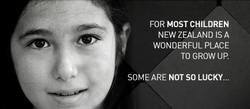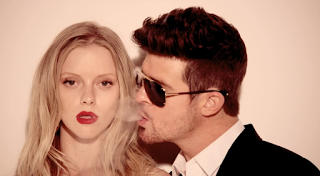|
I often send emails to people when I am concerned about something that is happening, when I want to point something out that is not right, or feel that my words may make a difference in the world. I have decided that I am going to start publishing emails like this on my blog. This is in the hope that perhaps someone reading my blog may be in the same situation and me, and reading my words may help them make the time/energy available to send a similar letter. Small steps to social change! (I am going through my archives, and this letter was sent to a Principal of a primary school following Robin Thicke's song 'Blurred Lines' being played at a junior school disco (children aged 5 - 7) last year.) Dear [Principal], First of all, thanks so much to you and the teachers for spending your Friday night entertaining children! You time is really appreciated. I just wanted to comment on some of the music played at the disco tonight. I realise it is an issue I am hyper-sensitive to, given my line of work, but I think it is an important issue that needs to be addressed. (The portrayal of sex and sexuality in music is one of the topics I speak about in seminars). This week there has been quite a bit of media attention given to Robin Thicke’s song ‘Blurred Lines’, (and the parody of it done by the Auckland Law Review) and it has widely been described as a song supporting rape culture, sexist attitudes and as being overwhelmingly misogynistic. I was therefore very surprised when it was played at the junior school disco this evening. This is the song here. Watching five year olds dance to the lines “I'll give you something big enough to tear your ass in two” left me feeling deeply uncomfortable. Others will sum it up the issues in this song far more eloquently than me – in particular this article. Children should not be exposed to music that they are not capable of critically deconstructing. We discuss many things in our home, but [my five year old son] is not ready for a discussion on rape culture. I know that some people will say “the kids don’t understand the lyrics anyway”. However if we send the message that this song is OK now, how do we then tell them it isn't right when they do understand? I propose that for future events, all songs are thoroughly vetted before going on the playlist. Kind regards, Rachel Hansen * The Principal responded immediately, agreeing with my concerns.
0 Comments
 I am sick and tired of victim blaming. I am sick and tired of seeing directives for women on how to "keep safe". I am sick and tired of seeing resources put into "keeping women safe" while the equivalent amount of energy is not directed towards educating their would-be attackers on not attacking. Earlier this week I was dismayed to see my own town was jumping on the bandwagon when I read the headline "City angel' to keep eye on women". It caught my attention because it sounded a bit creepy. Women need to have an eye kept on them? (I guess we do if you subscribe to the patriarchal notion that we probably shouldn't be out and about by ourselves anyway because we will probably use our evil forces to tempt men to attack us. But I digress.) The article states that "Young women out on the town in Palmerston North now have their very own "angel" to look out for them....in the hope of reducing harm and victimisation of young women as a result of excess alcohol consumption." NO! Stop right there. Victimisation is NEVER the RESULT of excess alcohol consumption! The only reason a young woman is victimised is because SOMEONE ELSE assaulted/raped her. End of story. Being generous, I tried to interpret the initial sentence as meaning that the 'Angel' would help protect the women from other people (presumably men) who had consumed too much alcohol. But no, it wasn't anything to do with the men - the 'Angel' "would work with young women in particular to make them aware of the harm intoxication can bring, as well as how to stay safe in the city." I absolutely agree that alcohol can cause harm to oneself. Heck, I have been there. But we need to be clear that alcohol never ever ever causes a woman to be victimised. The council is putting money into making women change their behaviour, but ignoring the fact that the problem is actually the rapists. In doing this they are putting the blame squarely on the females. Furthermore, the big issue with this sort of "crime prevention" is that any behaviour change of potential victims simply displaces the crime. As a friend of mine commented, this approach simply says "Don't get drunk girls, stay sober and make sure another girl is victimised instead." I am just so weary of the same-old same-old "watch out women you need to be more careful" line, when our leaders could equally be saying to men: "Hey, the vast majority of rapists are men - are you sure you are safe enough for us to let you out on the streets?". I think the concept is excellent - someone helping out young people in town. Someone educating young people on the harm alcohol does. But to gender it, to solely focus on females, doesn't solve the bigger problem. The problem is that we have a rape culture that enables men to justify their actions and leaves women scared to walk through the Square at night. The follow-on effect this has is that victims are made to feel they didn't do enough to stop their attacker and the attackers can lean on our rape culture and point out all the things his victim did "wrong". (To learn more about rape culture I highly recommend you visit this site) I would feel far more at ease with this initiative if the same amount of energy was given to having consent conversations and education with the males in town. If this is happening already and I am unaware of it, then FABULOUS and I will eat my words and issue a hearty apology (whilst also pointing out that that story obviously wasn't worth newspaper headlines). Come on Palmerston North City Council, where is the money and resources for consent education for males out on the town? Why must it start with changing the women? Why is it always about us, and our behaviour? This is the update of the Diva/Playboy situation from Suzanne Culph at Change.org. See my earlier blog post for some background on the issue.
"Huge news! Reports are coming in from supporters in Perth, Brisbane and Adelaide that Diva staff have been removing some Playboy products from display. The campaign is working - but Diva management continue to dig in their heels and are refusing to withdraw Playboy nationwide. Diva’s brand is taking a beating - both online and offline. They’re monitoring what their customers are saying about them online every moment. Taking a respectful message about why you signed the petition directly to Diva right now could tip the balance. Click here to post a personal message on Diva’s Facebook page. It’s important you speak from the heart about why this campaign matters - but if you need some help, here are some ideas on what to say: • Why you’re personally against promoting a porn brand like Playboy to girls. • As a parent and customer how it will influence your shopping decisions. • The impact of the porn industry on women and perceptions of women. The petition started by Collective Shout on Change.org has transformed into a movement of parents and shoppers, determined to hold Diva to account for pushing Playboy products on to young girls. And we’ve been phenomenally successful, some Playboy merchandise has been shoved under the counter “because of the controversy.” Diva’s General Manager Bianca Ginns continues to say they’re just following a fashion trend. Let’s make sure Diva know that selling the porn industry to young girls will never be fashionable - click here to share with Diva why you support the petition by posting on their Facebook wall. Thanks for all that you’re doing, Suzanne, for the Change.org team."  Image from www.childmatters.org.nz This morning my 2 year old son:
Lead story: "A 24-year-old man has appeared in court on a charge of assault after the body of a five-year-old girl was found in her Napier home early this morning." Another story: "Child advocacy organisations are calling on those that turned a blind eye to the systematic abuse of a nine-year-old Waitakere girl to be held accountable." More statistics to add to New Zealand's appalling child abuse record. After a morning delighting in the happiness of my toddler, this shocked me back to reality. Far too many kiwi kids are not spending their Christmas holidays filled with care and love. Too many children have days full of fear and pain. I am sick of reading about the deaths of innocent children, and subsequently of the individuals that turned a blind eye to the abuse. A number of people have already admitted that they knew about the horrifying situation the 9 year old girl in Waitakere had been enduring for two years. I am sure that right now there will be many people wrestling with the guilt of not saying anything that could have saved the life of the 5 year old girl in Napier. I wish that every child in our community could enjoy a Christmas free of violence and anger. But domestic violence surges over the festive season. So I know I will read about more violence and possibly more deaths before this festive season is over. We all need to take responsibility for this epidemic. People are working hard, very hard to address the problem. Child Matters is one such organisation. Visit this website, read the material, support their work. And in the midst of your Christmas celebrating, do think about the many kids in our communities for whom Christmas means a very different thing than the Disney fairytale. Maybe we all need to consider what we each can do to help in the fight against this epidemic when we are pondering our 2011 resolutions.  This article featured as a guest post on Enlighten Education's blog a few weeks ago. The article deconstructs the media’s portrayal of violence committed by girls and asks us to focus on the real issue: that girls and young women urgently need our support. Periodically the media will seize upon an isolated incident or two and make sweeping generalised statements. In recent months, we have seen a lot of the tried and tested “girls gone bad” story, focusing on girls’ violence and bullying via internet and text messaging. No one will deny that the “girls gone bad” headline is a great attention-grabber. Girls engaging in violence challenge society’s fundamental beliefs about females as nurturers, protectors and as victims of violence. Yet in emphasising cases of girls’ violence more than boys’ violence, the media perpetuates the notion of the “bad girl” epidemic. This in turn legitimises violence as an option — “Other girls are doing it, why can’t I?” Social anthropologist Dr Donna Swift believes that: "the media . . . is creating the image of a new feminine epidemic of mean girls. Similarly, kickass girls, as I call them, are being promoted by the entertainment industry as the new role model for girls. This is a role model that promotes sexualised aggressive behaviour and rarely is our society countering this by teaching girls that assertive behaviour is an alternative option. Sadly, many young males find girl fighting titillating and some girls turn to this behaviour as a way of attracting male attention." Professor Kerry Carrington, from Queensland University of Technology’s School of Justice, said a simple internet search yielded 73 million hits for girls’ fighting, compared with 31 million for boys. There were 24 million girl-fight videos on YouTube – eight times more than those featuring boys. I propose that girls aren’t engaging in more fights than boys but that because female fighting breaks traditional norms, society is fascinated by it and gives it much more attention than male violence. An example of this fascination is the beer advertisement from the USA in which two women with plunging necklines have a minor disagreement. They begin to wrestle and as they do so, they discard their clothes, revealing sexy bodies in skimpy lingerie. They end up writhing and moaning together in wet concrete. At the end, two men imply that such a fight scene is every man’s fantasy: “Who wouldn’t want to watch that?” Focusing on the real issues What the “girls gone bad” sensationalist headlines don’t mention are the triggers and history behind girls’ violent offending. Focusing on hyped-up incidents sells newspapers because it shocks readers. It also makes it easier to ignore the real problems young women are facing. Dr Donna Swift is leading a research project in New Zealand that looks at violent and anti-social behaviour by teenage girls. Initial findings from the project indicate that of girls engaging in violence towards others, approximately 70% were not attending school, 60% were self-harming, 50% had experienced text bullying, 50% had run away from home, 40% had witnessed domestic violence, 30% had been raped and 30% had taken a drug overdose. Such findings are backed up by numerous international studies. At what age does society stop blaming the situation or the parent, and start demonising the child? As other commentators have noted, we need to remember that the violent girls we demonise in the media today are the abused and neglected children we read about with such compassion yesterday. More often than not, the demonic “girl gone bad” is a child who is actually desperately in need of love and support. Sensationalist media stories that focus on the negative exaggerate the problem of girls’ violence in the public’s eye and in doing so create a monster out of the teenage girl. This further demonises young women and creates a disconnect between them and the community – a community full of people who could potentially act as friends, mentors and advocates for the very girls that they are demonising. Increasingly, girls are engaging in other types of violence that very rarely hit the headlines: "Many young women are growing up with the societal expectation that they can do anything and must do everything. According to females portrayed in the media, girls should be brave, independent, strong, smart, savvy, athletic, and able to kick ass as well as being beautiful and sexy, be wanting and waiting for a relationship with Mr Right, able to produce adorable children, keep a perfect house and be ready to climb the next step on her career ladder. Girls who can’t compete for this reality take out their anxieties about personal inferiority or anger of rejection on themselves." – Dr Donna Swift Tragically, for many girls, acts of violence towards themselves, such as cutting and bulimia, are an everyday reality. Focusing on the positive We need to look beneath sweeping media generalisations about girls and violence. We need to celebrate the fact that the vast majority of our girls will never choose to engage in violent acts. We need to understand that the girls who do usually have long histories of victimisation and need the full support of the community. We need to focus on giving our girls the tools and the confidence to face up to the challenges of teenage life today. We need our communities to be overflowing with support for our girls. Only then will we be able to start turning the tide against self-harm, depression, bullying and violence. |
AuthorRachel is a writer and educator whose fields of interest include sexuality education, gender, feminism and youth development. Archives
November 2023
Categories
All
|


 RSS Feed
RSS Feed




